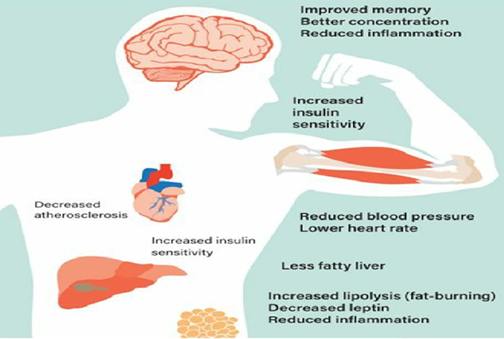Do You Know Fasting Can Boost Brainpower?

Do You Know Fasting Can Boost Brainpower?
Mammals generally respond to severe caloric deprivation by reducing organ size, with two prominent exceptions: the brain and, in males, the testicles.
Reproductive function is preserved to propagate the species.
But cognitive function is just as important and also highly preserved, at the expense of every other organ.
This makes a lot of sense from an evolutionary standpoint.
Suppose food is scarce and difficult to find.
If cognitive function started to decline, the mental fog would make it that much harder to find food.
Our brainpower, one of the main advantages we have in the natural world, would be squandered.
So, what happens during caloric deprivation is that the brain maintains or even boosts its abilities.
Humans, like all mammals, have an increase in mental activity when hungry and a decrease when satiated.
We have all experienced a “food coma” Think
Mammals generally respond to severe caloric deprivation by reducing organ size, with two prominent exceptions: the brain and, in males, the testicles.
Reproductive function is preserved to propagate the species.
about how you feel after a big meal.
Are you mentally sharp?
Or dull as a concrete block?
As the amount of blood going to the digestive system is increased to handle all the digested food, less blood is available to go to the brain.
The only mental challenge we can handle after that enormous meal is sitting on the couch watching football or playing.
How about the opposite?
Think about a time that you were really, really hungry.
Were you tired and sluggish?
I doubt it.
You were probably hyperalert, your senses sharp as a needle.
Animals that are cognitively sharp and physically agile during times of food scarcity have a clear advantage when it comes to survival.
If missing a single meal reduced our energy and mental acuity, we would have even more trouble finding food, making it more likely that we would go hungry again, leading to a vicious cycle ending in death.
That’s not, of course, what happens.
Our ancient ancestors grew more alert and active when hungry so that they could find their next meal and the same thing still happens to us.
Even our language reflects the relationship between hunger and mental acuity.
When we say we are hungry for something, hungry for power, hungry for attention, does it mean we are slothful and dull?
No, it means that we are on our toes, alert, and ready for action.
Fasting and hunger energize us and activate us to advance towards our goal, despite popular misconceptions to the contrary.
In one study of mental acuity and fasting, none of the factors measured including sustained attention, attentional focus, simple reaction time, and immediate memory were found to be impaired.
Another study of two days of almost total caloric deprivation found no detrimental effect on cognitive performance, activity, sleep, and mood.
That’s what happens to our brains during fasting.
But the neurological benefits of fasting aren’t limited to the times when we’re forgoing food.
Animal studies show that fasting has remarkable promise as a therapeutic tool.
Aging rats started on intermittent fasting regimens markedly improved their motor coordination, cognition, learning, and memory.
Interestingly, there was even increased brain connectivity and new neuron growth from stem cells.
A protein called brain-derived neurotrophic factor (BDNF), which supports the growth of neurons and is important for long-term memory, is believed to be responsible for some of these benefits.
In animals, both fasting and exercise significantly increase the beneficial BDNF effects in several parts of the brain.
Compared to normal mice, mice on an intermittent fasting regimen showed less age-related deterioration of neurons and fewer symptoms of Alzheimer’s disease, Parkinson’s disease, and Huntington’s disease.
Human studies on caloric reduction find similar neurologic benefits and since fasting certainly restricts calories, this is one area where fasting and caloric reduction provide similar benefits.
With a 30 percent reduction in calories consumed, memory significantly improved and the synaptic and electrical activity in the brain increased.
In addition, insulin levels have an inverse correlation to memory that is, the lower the insulin level, the more memory improves.
On the flip side, a higher body mass index is linked to a decline in mental abilities and decreased blood flow to those areas of the brain involved in attention, focus, reasoning, and more complex, abstract thought.
So fasting provides neurological benefits in two ways: it decreases insulin and leads to consistent, maintained weight loss.








